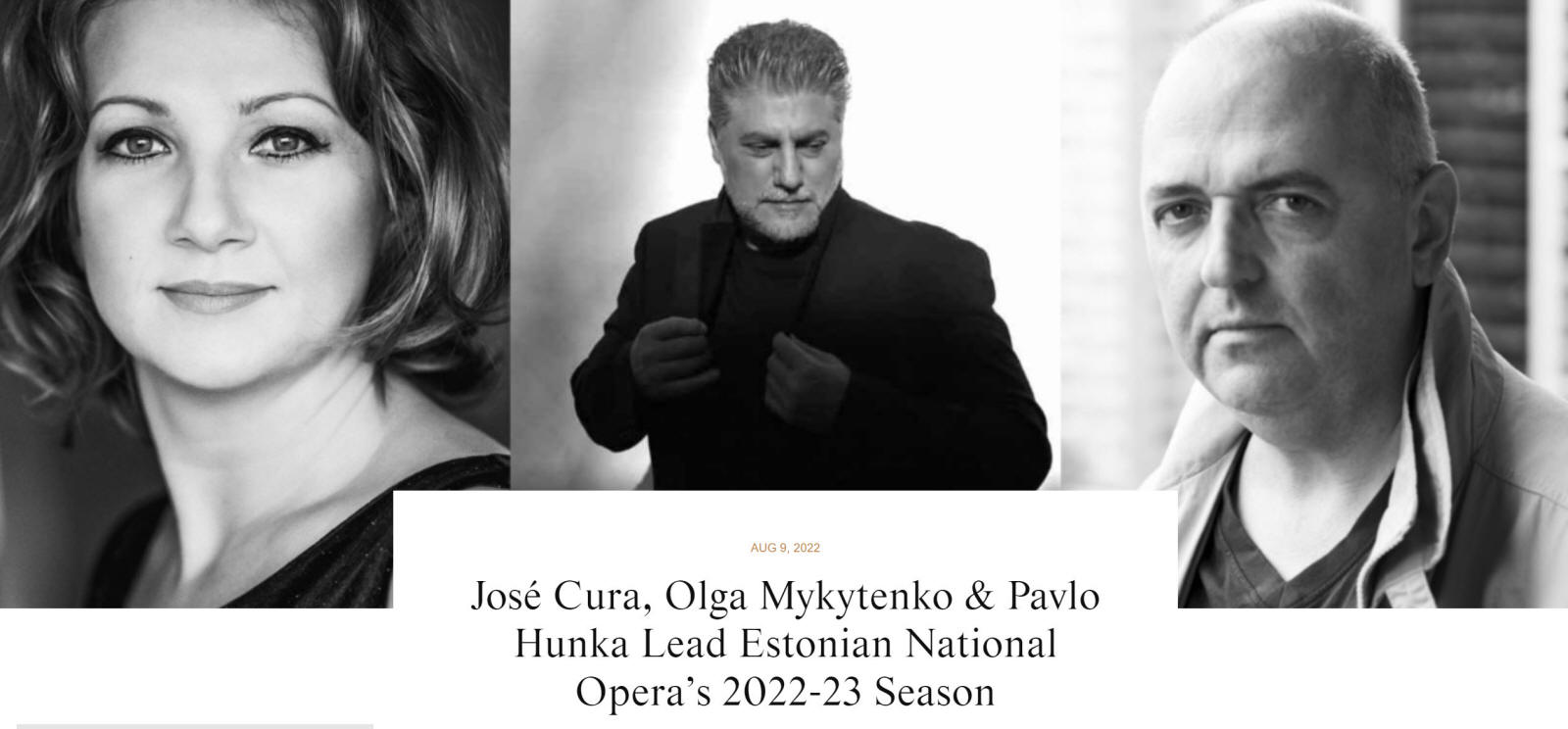
La fanciulla del West
Performance Dates:
Nov. 18 & 20, 2022Bravo Cura
Celebrating José Cura--Singer, Conductor, Director
Operas: Fanciulla
Fanciulla in Tallinn
2022

La fanciulla del West
Performance Dates:
Nov. 18 & 20, 2022
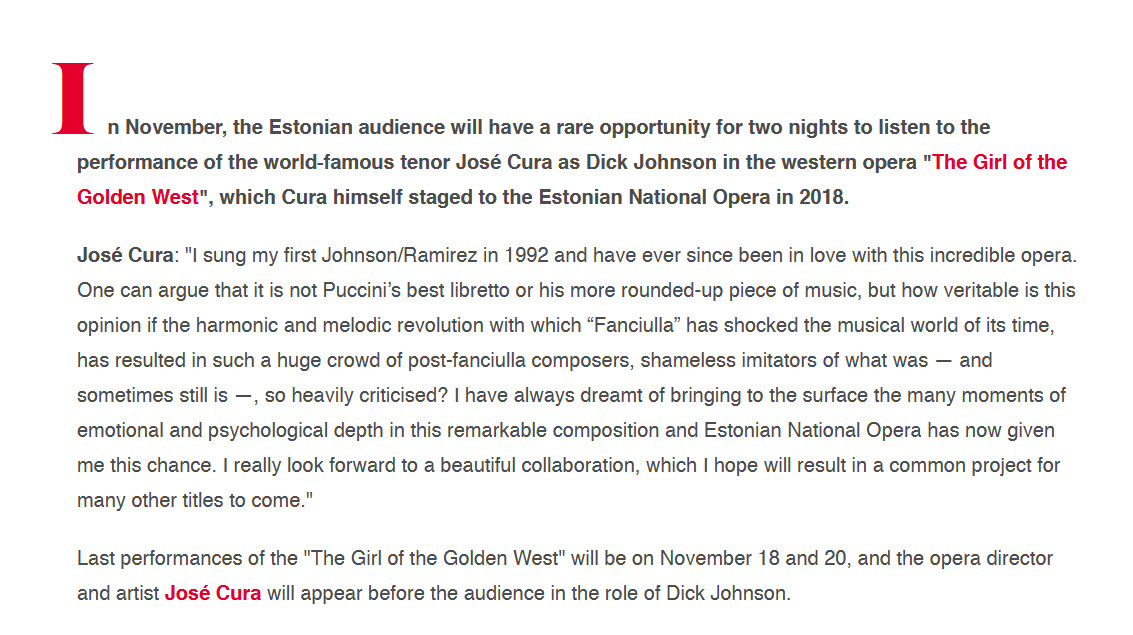

|
|
2018
Director and Conductor
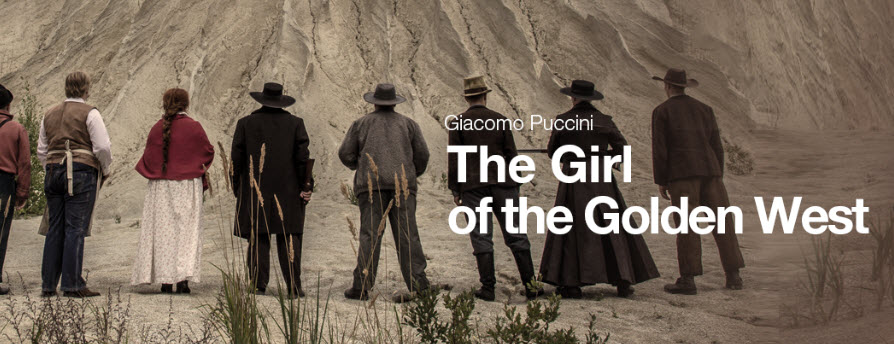
La fanciulla del west at the Tallinn Opera House
21 and 23 September
Set Design, Stage direction, Conductor
Tallinn
Conductors: José Cura (Argentina), Vello Pähn, Jüri Alperten
Stage Director and Lighting Designer: José Cura
Costumes: Silvia Collazuol (Italy)
Note: José Cura will be on-site for only 21 and 23 September; Cura's production then enters repertoire with a different conductor / management team
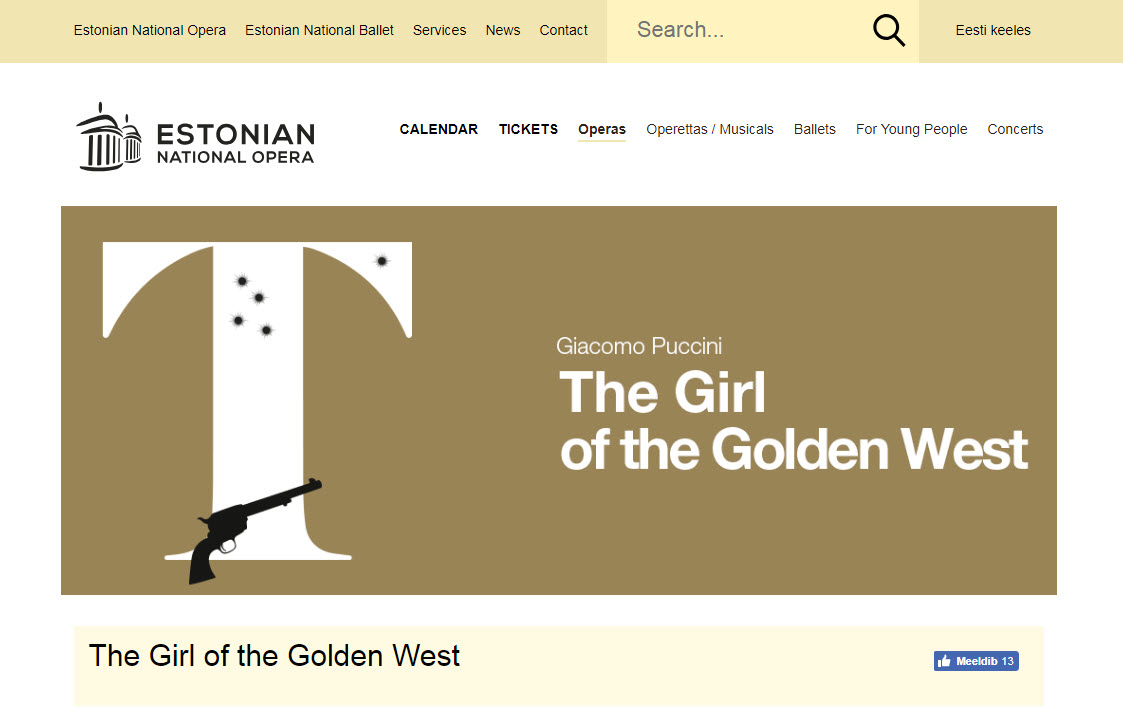
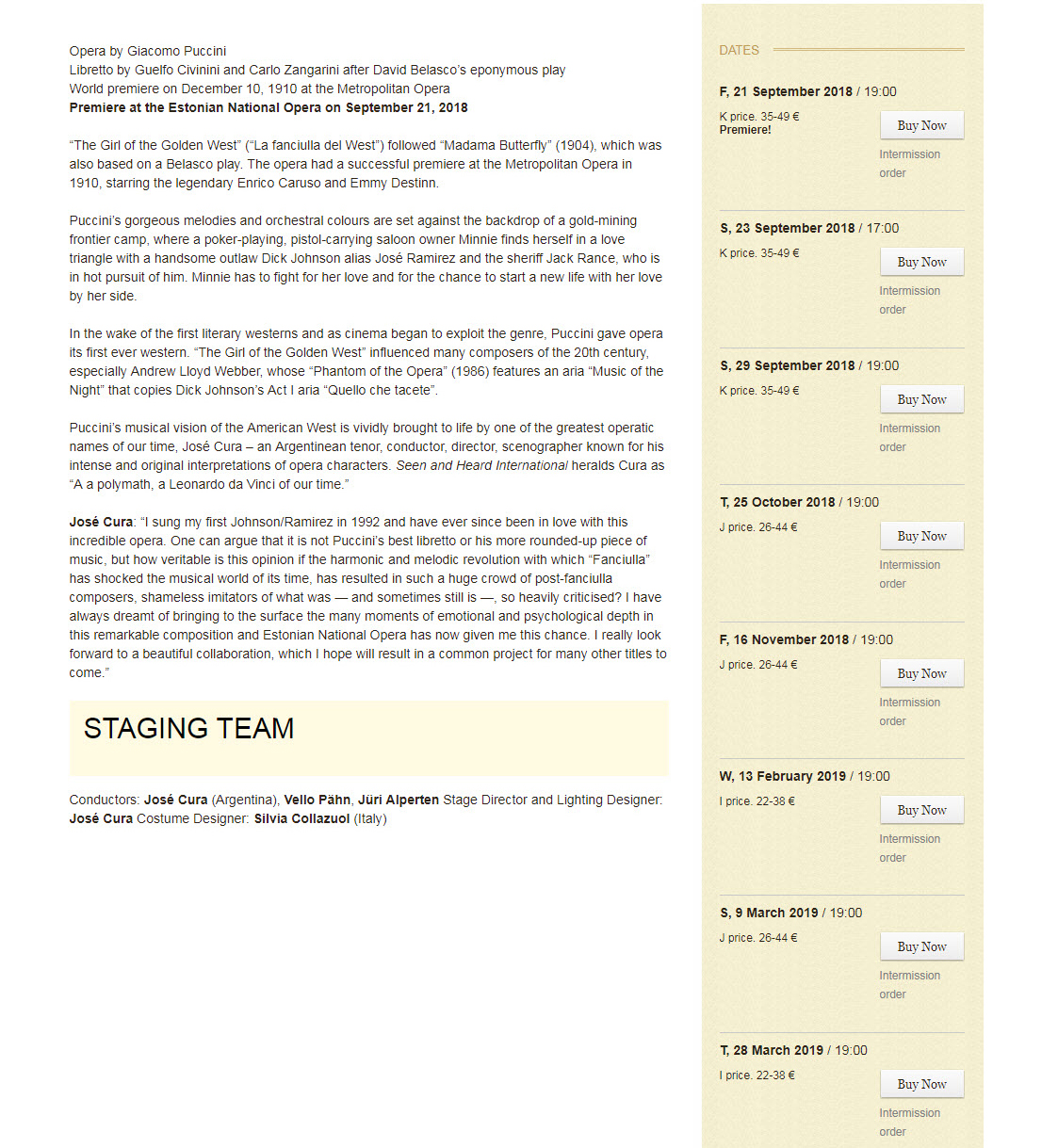
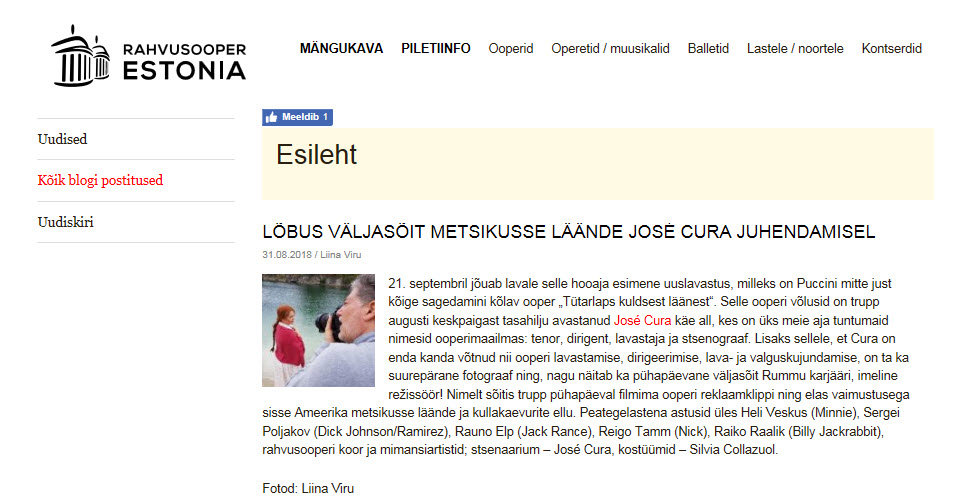
|
|
|
|
|
|
|
JOSÉ CURA: I WAS A REAL REBEL! Opera Stina Vürmer 10 August 2018
In the autumn, the Puccini opera La fanciulla del west, directed by José Cura, reaches the stage of the National Opera. According Cura, he would not be who he is today if his wife Silvia had not been close by. Silvia chose the role of housewife and mother so that the other side of the sacred union could realize his dreams. You travel a lot. Doesn’t being away from home so much destroy the roots? Look, the sequoia can grow up to several hundred meters, but its roots are in the earth. When the roots are removed, it will die. The same is true with a person - you can go far, see, experience, but if the roots--the family--are strong, we continue to stand. Argentina is my home country. My sister, my brother and my friends live there. I have lived in Europe for the last 30 years, but I have not lost my roots. And I also have new roots in Madrid. If I did not, then I would be punishing myself. I would try and it would all be too painful. I have my Silvia, with whom I have spent the last forty years. I have my three children – my eldest son is starting his acting career, my daughter is a photographer and my younger boy is studying physics and mathematics at the university and is a professional rugby player. All of them are very different and very good. How much have you been guiding your children? I have directed them in such a way that they have not realized what I was doing. (Laughs.) If you tell a kid he has to read this book, he will not do it. The book has to be secretly cherished somehow ... My son, who is an actor, made his first stage performance with me. In one opera, the role of a little boy was needed. I invited my then-eight-year-old child, who liked it, and his interest began. I believe that this could have affected his later choices. You also have several passions in addition to music. You're a photographer and a skilled workman. Photography is a good hobby – you learn to watch, see things next to you. But about using the hammer – I have to be careful about it. If I hurt my fingers, then for a while I will not sit behind the piano. Argentines have a pretty saying: "Even the mustache is not an excuse." No matter how delicate you are, there are simply good things in life that should not be feared. We are all humans. I have designed or built everything in my home in Madrid. True, not the house itself. Sometimes when I look at some of my own thing – well, it may not be very good, but it has other value. You seem to be a simple person. I am. What is the point in having your nose in the air? Sooner or later, life has a way of compressing it. But my professional nose is up and not because of arrogance but because of years of experience and confidence, and I appreciate the qualities of everyone I work with. I know what works and doesn’t. I can see from the beginning if the responsible person is inexperienced and asking for things that are not right. It takes time, money, energy. He acknowledges to himself two days before the premiere that the plan was wrong and everything should be redone. There is no need to prove that you know everything when you really don’t know! Trusting your team is the most important thing in any field. You give the audience thrills, emotions. What do you get for yourself? I get the same energy, good emotion. I have some disappointments on my travels. I see the theater, the stage, meet great people and the orchestra - all! But in the evening I see the hotel room and the bed. I spend between twelve to thirteen hours a day between those walls. So no matter where you are - there is sleep and music. That’s it! You are in the middle of it, you get used to it. And when it's all over, I don’t usually go out to discover a city as a tourist. The life of the opera singer is caviar and champagne in Hollywood movies only! The real life is that you are going to a hotel room and since you have not been able to eat during the day, you’re going to stick to the contents of a mini-bar and then fall asleep. The world is big, but you've returned to Estonia again and again. Why? You don’t make the big houses, the people who are in it do. As long are there are great people with shining eyes, I’m going to return again and again. And there are such people in Estonia! Why do you think it's better in Vienna or New York? There's often the way that everyone is used to everything, nothing is surprising. You know what I mean? Your national opera has nothing to regret in comparison with other large opera houses - there are professional people, orchestra, choir. They are really brilliant! You are a composer, choir leader, director, artist, singer. Were you active on so many fronts as a child? I was a real rebel! I caused headaches and messes but at the same time I was very polite. I have always had a spirit of protest-- I liked to argue against everything and with everyone. I received a very cool gift from my mother on my 40th birthday. She gave me a letter I had no idea existed from when I was 9 years old that my teacher gave me. It said: "Dear Mother of José, I want to tell you that little José is a very temperamental boy who always leads everything and everyone. If there's a problem, he’s always the first one. If there’s something good going on, it’s him first.” The teacher concluded with a sentence in the sentence, "I imagine that José will become a great person." This was such a heartfelt letter. And you're a great person who has been walking with your wife Silvia for 40 years. We met in 1979 and will soon be celebrating it. What is the secret of a good long relationship? Patience and skill and desire to listen. In everyday life we are equal, but when she goes to bed, she is a woman and I am a man. I'll open the door for her, I'll help her on with her coat, bring her flowers. When I'm sick, she takes me to bed and helps me. Everyone does everything in our home. I can wash socks, cook meals, but when there's a moment I need to stand up for my family and wife, I'll do it. As a man, as a father. I do not do this because Silvia is weak - no! It's in my blood that I want to protect my wife. There is much talk about equality right now. What do you think of this? This topic is being discussed incorrectly and politically exploited. Clearly, everyone must have equal opportunities. This is human rights. But let's be honest - a man is a man and a woman is a woman and that is how it should remain. This wonderful gentle relationship between the two sexes is awesome! Why destroy it? I want to treat women as women, but when we look at it from the work level, I want us to be seen as the same - if she is better than me, she needs to get a better salary. I know many successful women who are educated, nice and strong, but they are alone. This is because they cannot find a man who fits into their world. They say they prefer to be alone rather than being together with a stupid man. We are socially capable and we must be equal, but please allow me to continue to bring flowers, open doors, compliment them. Do not take it away from men! I want to serve women as queens. Your days are spent in front of hundreds of eyes and in the spotlight. Have you ever had a moment when going on stage felt mentally or physically impossible? I had a severe burnout a year and a half ago. I had been working daily for thirty years, I had been very active every day and my body just said, “Now it’s time for a break!” I don’t want to go into details, but it was a good lesson. It was time to think over things. I have been caring for others for years, but not for myself. I do not want yesterday's misery after my death. It would be egoistic - the sufferers would be those closest to me. You will perform the Puccini opera on the national opera ... La fanciulla del west is one of my absolute favorites! Tell me what can be a more powerful privilege than when you are expected to create a top-notch business, doing what you love the most! Is what I do is a job or a hobby? I would like to say that it is the last one, but I get money for it. I used to worry about what one or another critic would write later, but I no longer think of it. If I can close the door so that the heart is satisfied, then it's the best. You cannot be liked by everyone and you cannot make everyone happy, but you must feel happy and glad The interview was published in the March issue of the Jjournal Chronicle
|
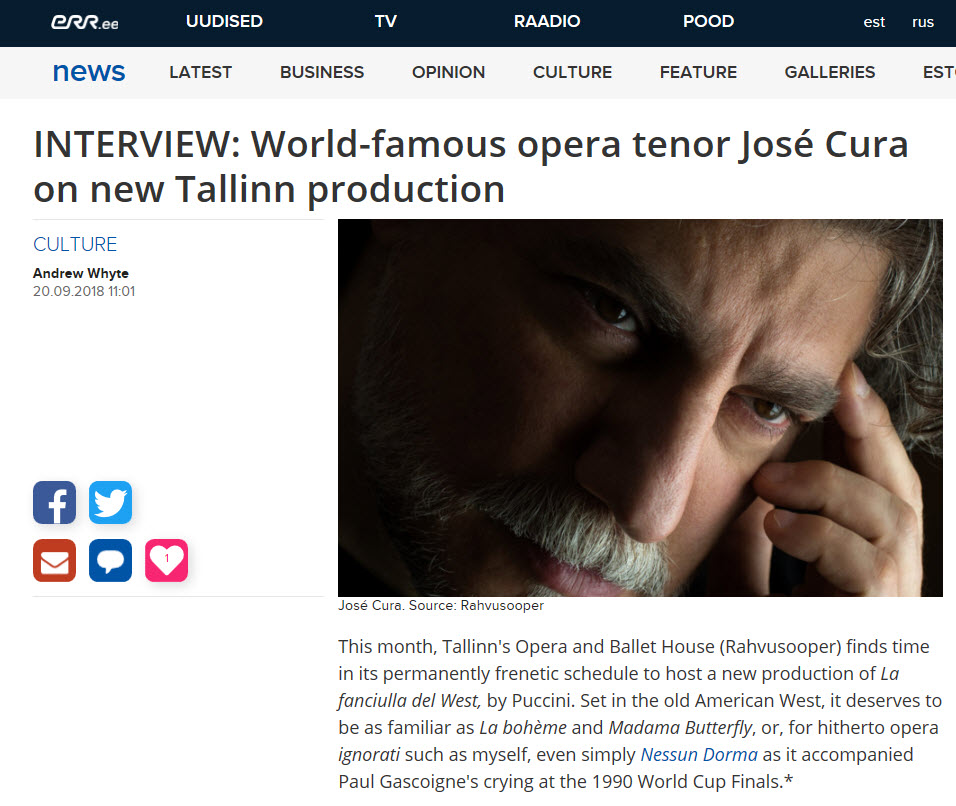
|
This month, Tallinn's Opera and Ballet House (Rahvusooper) finds time in its permanently frenetic schedule to host a new production of La fanciulla del West, by Puccini. Set in the old American West, it deserves to be as familiar as La bohème and Madama Butterfly, or, for hitherto opera ignorati such as myself, even simply Nessun Dorma as it accompanied Paul Gascoigne's crying at the 1990 World Cup Finals.* Directed by Argentine tenor José Cura, some time protégé of Plácido Domingo, let's sit back as he tells us about La fanciulla, realities of opera in the twenty first century and how Tallinn compares with the many other places he has worked. I remind José that he is one of two famous Argentinians in Tallinn in the month of September; Jorge Bergoglio – Pope Francis – is paying a flying visit later in the month. ''I didn't know that, that's the problem of working in the opera all day, I never get to read the newspapers,'' says José, who will miss the pontiff by less than 24 hours as he, José, leaves Tallinn on 24th September. Tallinn versus New York or Milan But what does he make of Tallinn and the Opera house so far, and how does it differ from other opera houses? ''It's on a scale different from other places I've been in, which brings me a lot of peace. The theatre itself has a beautiful family atmosphere, the audience size (800-900) is intimate, something which is not the case, say, in the Metropolitan in New York (audience sizes of around 3,000), which is almost a small city''.
José Cura. Source: Rahvusooper ''We often have to 'share' artists here in Tallinn who have been rehearsing another piece the day before they are working with you,'' he says, explaining some of the economic realities of smaller-city opera. ''This is not just in Tallinn, it's something characteristic of any repertoire house, as opposed to what we call a stagione, or season house, like La Scala in Milan, where the whole house is dedicated to the one production without crossing over''. ''This means there are fewer distractions, but on the other hand it is less economical than the type of repertoire house which predominates in places like Germany and Austria as well as here in Estonia''. ''Tallinn is a bit like Disneyland, but in a good way I mean – I hear people here complain about the traffic, but believe me rush hour traffic here is like three in the morning in Milan or Buenos Aires,'' both significant places in his career, naturally. Truly a polymath Speaking of which, José is a formidable subject. Many interviews tend to begin with a short intro about interviewee's background, followed by the one area of life that makes them interesting or significant. But José Cura is by turns an opera tenor, conductor, musician (an accomplished guitarist), director, set designer, photographer not to mention a father of three (including noted British actor Ben Cura) and director – his current role in Tallinn. Whilst José says he compartmentalises these aspects of his career well enough, less than half that number of achievements would be outstanding for most of us. Yet he is not arrogant – or no more so than what he himself accords to the general Argentine national character. Looking at José's early life and career explains much.
José in rehearsals for La fanciulla del west. Source: Rahvusooper/Liina Viru. Growing up in Argentina ''I started singing in Argentina, but due to economic constraints had to move to Italy to make a career. Argentina at that time was in the immediate aftermath of the military Junta which ruled the country since the mid-1970s. Those first years of democracy weren't easy for anybody, not least in the artistic field where the first cuts to be made in an economic crisis are in education, culture etc.'' ''Forget about earning your living as a composer or conductor in those days. There were hardly any orchestras to conduct, hardly anyone who would commission work. It was a road to nowhere, though it has to be said it's not easy to make a living as a composer generally unless you are one of the few who write movie scores; many of them are teachers, performers etc. as well''. Making the best of the cards dealt ''I decided to be a tenor, which of the four male voices [the other three are countertenor, tenor, baritone, and bass-ed.] is the hardest to find and therefore pays best; I was married at 22 and had the first child when I was 25 so it wasn't easy to combine everything. I never wanted to become a 'star' singer, but things happened that when I look back seem unbelievable''. ''One part of it is fate, another is carpe diem, a bit like being thirsty in the desert when it starts raining (ie. fate) but having a cup as well to catch the rain (ie. carpe diem). My teenage years had been hard too with the Junta, who came in to crack down on the anarchy and terrorism which preceded it. They succeeded in that but ended up becoming like a cure that was worse than the illness and they stayed too long in power''. ''Then the war happened. It was my generation that fought in it and did military service,'' says José, referring to the short, but surprisingly brutal 1982 Falklands/Malvinas war. Always something of an elephant in the room when an Argentinian and British person meet; if they are old enough to remember it – I was only eight but it was a seminal event in my life too – the British person will always feel a bit uneasy and wonder who is going to mention it first (invariably the Argentinian person). ''Many of my contemporaries died in that war; there was a lottery for military service so once again fate played a hand and I was one of the lucky ones who didn't get called up. The times were hard, but in a way that makes you stronger and able to survive other times of adversity''. Is opera élitist? Back to Estonia, and the differences with audiences here. I opine that opera doesn't seem to be an élitist thing in Estonia, as it can be in Britain. ''I haven't experienced what audiences are like here yet, but with all due respect, English society is a bit snobbish, at least implicitly, a bit like being nervous or over the top is implicit in Italian society. These are clichés of course but they are there. My answer is that 'yes, opera is an élite, but it is not an economic élite'. Tickets to Covent Garden [where José has worked several times] are expensive but to see a top football game with Juventus or whoever costs four times as much''. ''The degree of pleasure a person gets from the opera and other classic art is in direct proportion to the amount of time and effort that person invests into digging into the form of art you want to appreciate. Only an élite – as I say nothing to do with money, but a small group of people – is going to invest that time and effort to get the necessary weapons or tools to fully appreciate and enjoy classic art''. Not just a catchy tune ''It works with art too – imagine standing in front of the Mona Lisa in the Louvre, what might have appeared just a smiley, chubby girl comes to life when someone explains to you what went into it in terms of revolutionary use of brush strokes, perspective and all the other things trapped in the painting. It's the same with classical music; if you go just because you like the tune, you'll only get about five per cent of the piece, but if you understand the whole use of the technique of constructing a symphony, based on a sonata form, which in turn is based on the use of a theme, and the transformation and development, and the stretching and compressing and cutting from one instrument to another etc. until you create a huge canvas of music; then you start to hear the genius of the composer.''
Rehearsing La fanciulla del west. Source: Rahvusooper ''The genius of the composer is not in a nice melody; almost anyone can come up with that, the genius of the composer is to create a whole universe with a melody of only twenty seconds, that is the genius of the composer. That is why people without great genius or only a short-term genius create melodies of one or two minutes, what we call pop music – which don't get me wrong can have incredible melodies, some of them even better than the classical tunes; but there's no mastery of the composer behind it in developing that tun into a symphony of one hour, for that you need to have a special preparation.'' ''And there's the difference. To understand that preparation you need to be prepared yourself. So is classical art for an élite? – yes, it's for an élite, of those who dedicate time to understand what they're going to enjoy, then enjoy it more.'' ''I used to say as an analogy, a professional performer needs a professional public to be understood, and that is what we are running out of in the 'wikipedia generation'. There's no way to do that with huge classic art. Who cares when or where Puccini lived, what is important is what he did.'' So whence does genius derive? ''If we knew where genius came from, people would find out and distil it or something. It's one of those things which is impossible to define. It depends on things like a person's upbringing and background; if you believe in God you could say that it was God-given, or if you believe in reincarnation, along those lines, but it's trying to define something which can't be defined; it's pointless to find an explanation for things which don't need one is pointless and in any case it destroys the magic''. ''One thing I have an idea of is that genius is something which belongs to humankind; geniuses were and are just human beings with their own problems and miseries which we all have, but they overcome them to make the genius flourish''.
The Opera and Ballet House in Tallinn. Source: Kaupo Kalda/Rahvusooper ''God is not a genius, there is no point of being a genius if you are God, the point of a genius is that it is a human being with all the virtues and vices we are all born with. For as long as we are alive, if we hold back our mysteries and develop our virtues then we may one day become a genius – not necessarily in art – but in all areas of life, for instance someone who did the best they could with the cards they were dealt. The potential to be a genius is in every human being, you don't have to be Mozart''. An overused term ''The word today is so underrated, getting applied to someone who kicks a football around, whereas what they mean is someone who is just a good football player. Sometimes you don't even know it when you see it; some of the most remarkable geniuses in history were neglected in their own time. I think it was Schopenhauer who stated that authors were divided into comets, which are pretty spectacular, and stars, which are just there – the light of the star is so far from us it may take generations for the light to reach the earth, and it is that way with real genius''. ''J.S. Bach for instance, who is the alpha and omega of music on which all our musical structure is based. He died as an organ player in a small church; it took 200 years for his light to fully reach the earth''. ''You call it genius, I call it a person who succeeds in life – if they perform the role nature gave them to perform in the machine of the creation, the real dimension of the impact of the presence of that person into our lives, we can only really fully sense when the person leaves, and we have the benefit of perspective. That is a good balance, because if someone is treated as a genius during their life, unless they are well balanced, they can easily turn into an idiot''. Audiences As to the role of an audience, José had this to say: ''To give an analogy, without wanting to cheapen things, an audience and the stage are like lovers for one night. The stage gives a lot of energy to the audience, and when it responds, the perfect relationship emerges and the performances are magic. But when the audience doesn't give love back, or hides behind the fact that they bought a ticket and are there simply due to that, it's almost a kind of 'hooker' feeling to it and such performances, though they don't happen a lot, it is sad, as if they're judging you and saying 'well I've paid for this product, let's see what the product brings'''. ''Whilst it's true that they have paid for a ticket, there shouldn't be that attitude. It should just be themselves with the opera, without microphones, monitors etc. Classical music is one of the few remaining human activities left. These ideas about robots replacing singers, machines replacing orchestras, while they are technically possible, the human factor always needs to be there. It would be the beginning of the end if we went down that route''.
Rehearsing La fanciulla del west, with Heli Veskus (centre). Source: Rahvusooper ''It's a very complicated time we're living in these days, with not knowing where we're going with climate change and things like that – I hope opera will continue but with all the global issues we have, for me it's not the most important thing. I'm more concerned about continuing social structure, who is going to pay pensions in the future. To find the real balance let's fix the house first, before we worry about having works of art inside''. Art isn't the be all and end all ''Art is like, as the French say, la cerise sur le gâteau, the cherry on top of the cake, but not the cake itself. To be worried about the high note of the tenor singing an aria, seems to me lacking in priorities. We artists are a beautiful complement to society, but we mustn't forget there are a lot of more important things than that''. That gives us the answer to my next question as well, as to what a person who was just starting to get into the opera should do. ''Choose a piece you think you might like, and just go for it – it's like reading a book, if you've never read in your life of course you don't start with Joyce's Ulysses, as that would kill you after a couple of pages, you start with something easier. However, if you hit on a writer with a great style you may still have to fight against the compulsion to close the book within the first few pages as the writer develops what he or she is presenting you with; if you are hooked after the first paragraph, the book promises to be very simple and then there's no joy,'' says Jose, reprising what he said earlier about the work required in appreciating classical art. Fine food versus fast food ''Even if you have to sit with a dictionary next to you the first time, on a re-read when you've got those things down then it will be pure joy. With the opera or the ballet it's the same; if you don't know what the dancer is doing you just see a person jumping up and down on the stage, but until someone explains to you the process behind it, the eight hours practice every day crying tears of blood, you won't get how wonderfully complicated it is''. ''The converse is 'fast food living', whatever you are doing. Fast food is delicious at the first mouthful, but when you've finished it, it leaves an emptiness, a feeling of 'now what?'''. So in other words, anyone can 'get into opera', just by doing it – but it is nonetheless hard work, especially in today's smartphone world. The new production – La fanciulla del west Work continues apace on the production of La fanciulla, a new production which is in two acts (it had been written in three acts). The production may be new, but José has been involved with La fanciulla since 1992 so it is a piece which he is intimate with. Based on the play ''The Girl of the Golden West'' by American author David Belasco, the opera follows the activities of Sheriff Jack Rance and his unrequited love for saloon owner Minnie, who in turn is infatuated with Dick Johnson, a bandit on the run with a gang being pursued by Rance. ''The last time it was performed here in Tallinn was in 1963 or 1964 so noone I'm working with has ever been involved in it before''.
José performing in a 2011 production of La fanciulla del west in Zürich, Switzerland. Source: Rahvusooper Isn't La fanciulla reminiscent of the Sergio Leone and Ennio Morricone Spaghetti Westerns? Not quite, it seems. ''Well they were called 'spaghetti' westerns if the director was Italian, 'chorizo' if Spanish and so on; they were European westerns, but I don't think you can really call La fanciulla that because the opera was conceived at the Metropolitan in New York (where it had its premiere in 1910), in a US context even if the composer was Italian. A place where cowboys were really part of the cultural history of the country [and only a couple of decades after the frontier was closed – ed.] and not just something from a comic book''. The genesis of Broadway ''And this was done years before Broadway and Hollywood really took off, but the genes are there – you can hear Bernstein, Gerschwin etc. in La fanciulla, so everything came from Puccini in that sense. He was the origin of Broadway really''. ''La fanciulla is a fascinating piece, and a difficult one, not technically, but to really dig into the piece beyond its initial, apparently easy-going Broadway-esque aspect. ''Even after 25 years of working with it, I find new things. For instance the character of Jack Rance, the sheriff, long seemed to me foolish in letting Minnie win the Poker game and in so doing save Johnson's life. But now I realise that Rance, as a pro gambler, would never intentionally leave the table, unless he had some motive – which he did, he wanted to give Minnie a chance to win the game, because he respects that woman. In that moment Rance proves to be a giant. I only noticed that recently, after all that time''. The future ''It's too soon to say how La fanciulla will pan out here; ask me again in a week and I might say something different. But I'm very much enjoying my work with the orchestra here and the beautiful rehearsals we've had, my walk in in the morning from the Old Town where I'm staying. In a few days we finish putting everything together''... What about the future ambitions for a man who has done more than most of us could conceive of? ''I'm still singing. I just did Peter Grimes [by Benjamin Britten-ed.], which I'd long wanted to do, in Monte Carlo. I wanted to perform it in England, but the people said come on, with your accent? I said 'excuse me, have you heard your accents when your singing in Italian?' How many English people have a pure 'received pronunciation' accent, probably not Peter Grimes, so who knows where his accent there would have come from. But anyway I've enjoyed doing it every where else''. This is after all a man who at the 11th hour was able to stand in and perform in the lead role of Bizet's Carmen due to the regular tenor falling sick, flown in to New York specially to do so. ''That was nothing out-of-the-ordinary to be honest, it's quite common in our business for that to happen, though maybe not over such a large distance. I had to dash through passport control and was jet-lagged after a huge flight, so I said to everyone on stage before that I'd make mistakes because I had not looked at this particular production, but the main thing was everyone had to keep me awake for the duration of the performance. Having been running just on adrenaline, as soon as the performance was over of course I collapsed into bed''. |
|
|
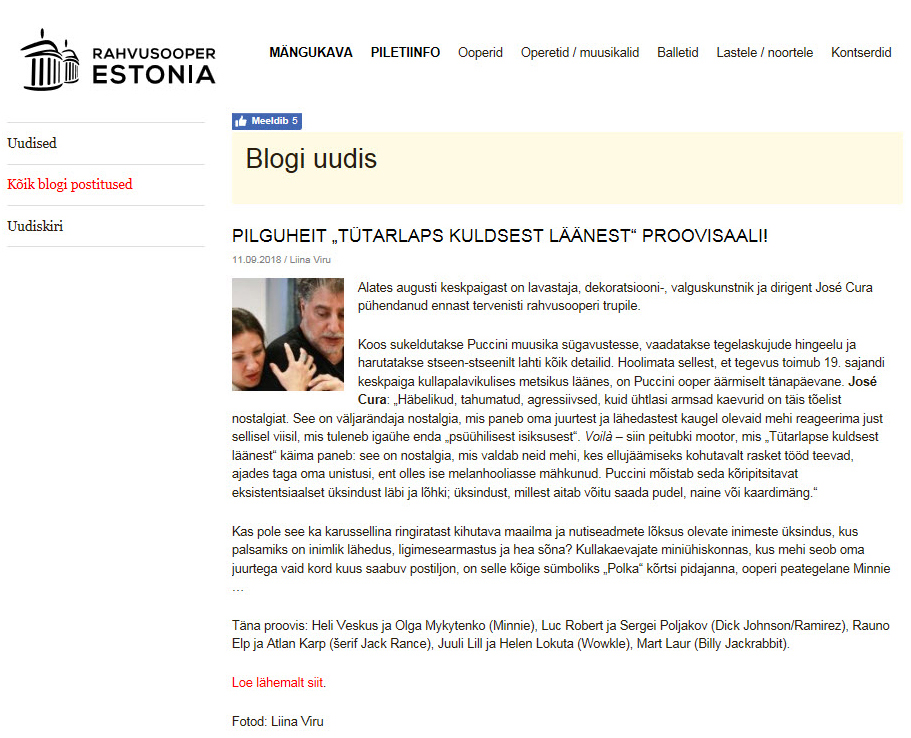 |
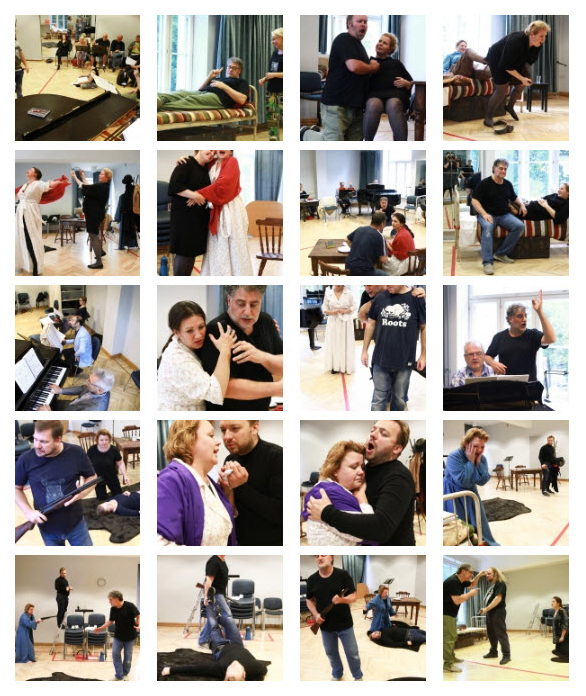 |
||||
|
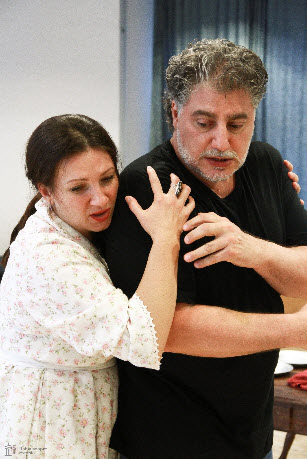 |
||||
| Rehearsal photos by Liina Viru, Estonian National Opera
Photo by Liina Viru, Estonian National Opera
Photo by Liina Viru, Estonian National Opera
Photo by Liina Viru, Estonian National Opera
Photo by Liina Viru, Estonian National Opera
Photo by Liina Viru, Estonian National Opera
Photo by Liina Viru, Estonian National Opera
Photo by Liina Viru, Estonian National Opera
Photo by Liina Viru, Estonian National Opera
|
|||||
|
|
|
||
|
|
|||
| Instagram Fanciulla
From Liina Viru's Facebook Page
Photo by Liina Viru, Estonian National Opera
|
|||
|
Rehearsal photos by Liina Viru, Estonian National Opera
Rehearsal photos by Liina Viru, Estonian National Opera
Rehearsal photos by Liina Viru, Estonian National Opera
Rehearsal photos by Liina Viru, Estonian National Opera
Rehearsal photos by Liina Viru, Estonian National Opera
Rehearsal photos by Liina Viru, Estonian National Opera
Rehearsal photos by Liina Viru, Estonian National Opera
Rehearsal photos by Liina Viru, Estonian National Opera
Rehearsal photos by Liina Viru, Estonian National Opera
Rehearsal photos by Liina Viru, Estonian National Opera
Rehearsal photos by Liina Viru, Estonian National Opera
Rehearsal photos by Liina Viru, Estonian National Opera
Rehearsal photos by Liina Viru, Estonian National Opera
Rehearsal photos by Liina Viru, Estonian National Opera
Rehearsal photos by Liina Viru, Estonian National Opera
Rehearsal photos by Liina Viru, Estonian National Opera
Rehearsal photos by Liina Viru, Estonian National Opera
|
|
Please note: The production
photos are by Gabriela Liivamägi, Estonian National Opera
Production Photos
Please note: The production
photos are by Gabriela Liivamägi, Estonian National Opera
Production photo by Gabriela Liivamägi, Estonian National Opera
Production photo by Gabriela Liivamägi, Estonian National Opera
Production photo by Gabriela Liivamägi, Estonian National Opera
Production photo by Gabriela Liivamägi, Estonian National Opera
Production photo by Gabriela Liivamägi, Estonian National Opera
Production photo by Gabriela Liivamägi, Estonian National Opera
Production photo by Gabriela Liivamägi, Estonian National Opera
Production photo by Gabriela Liivamägi, Estonian National Opera
Production photo by Gabriela Liivamägi, Estonian National Opera
Production photo by Gabriela Liivamägi, Estonian National Opera
|
| Fanciulla Miscellaneous
|
Last Updated: Sunday, November 20, 2022 © Copyright: Kira